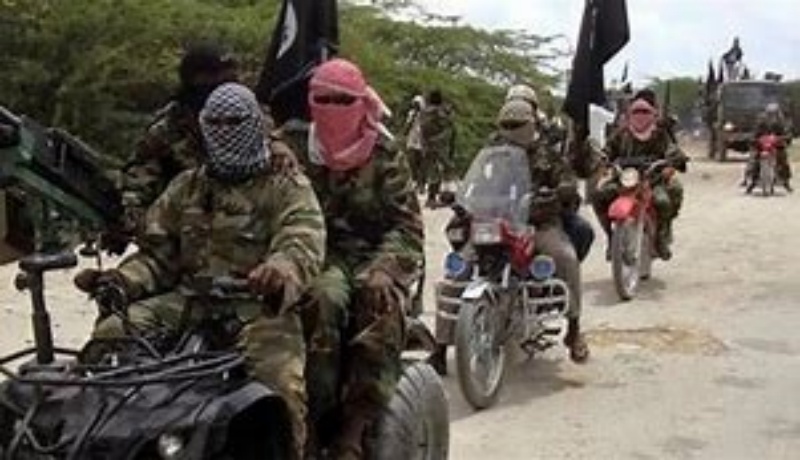- Nigeria moves up from eighth to the sixth position in the Global Terror Index in 2025
- Emergence of Lukarawas terror group was said to be the cause of the worsening security record
- Defence Headquarters, Abuja rejects the records, say Nigeria security on the part of improvement
Nigeria has been ranked sixth in the 2025 Global Terrorism Index, with a score of 7.658, moving up from its previous position of eighth in 2023 and 2024. The report further explained that a total of 565 persons were killed in Nigeria in the 2024 as a result of terror attack.
The report, released on March 5, 2025, reveals that Burkina Faso holds the top spot with a score of 8.581, followed by Pakistan (8.374), Syria (8.006), Mali (7.907), and Niger (7.776) in the second to fifth positions.
Other countries that made the top 16 include Somalia (7.614), Israel (7.463), Afghanistan (7.262), Cameroon (6.944), Myanmar (6.929), the Democratic Republic of the Congo (6.768), Iraq (6.582), India (6.410), Colombia (6.381), and Russia (6.267).
In 2024, Nigeria recorded 565 deaths from terrorism, reflecting an increase in fatalities over the past two years. This marks a significant rise from 533 deaths in 2023, which was a 34 percent increase from the previous year. Deaths from terrorism in Nigeria had previously peaked at 2,101 in 2014 but had decreased significantly in the following years, reaching a low of 392 in 2022.
The report also highlighted the growing influence of IS-Sahel, which has extended its operations beyond the Liptako-Gourma region of Burkina Faso, Mali, and Niger to Algeria, Benin, and Nigeria. In 2024, IS-Sahel carried out 16 attacks in Nigeria, 12 in Niger, six in Mali, and one in Burkina Faso.
Globally, the number of countries affected by terrorism grew from 58 to 66, the highest since 2018. The report noted that, despite a global decline in terrorism-related deaths since the peak in 2015, security conditions have worsened in many countries. Forty-five nations reported an increase in terrorism’s impact, while only 34 experienced improvements—marking the first time in seven years that more countries saw deterioration in security than improvement.

The Sahel region has become the global epicenter of terrorism, accounting for 51 percent of all terrorism-related deaths in 2024. This marks a nearly tenfold increase since 2019. The region also saw its conflict-related deaths surpass 25,000 for the first time since the inception of the index, with 3,885 of those deaths attributed to terrorism.
While Burkina Faso remains the most affected country, both deaths and attacks decreased in 2024, with fatalities dropping by 21 percent and attacks falling by 57 percent. However, the country still accounted for one-fifth of all global terrorism deaths.
Niger, however, saw the largest increase in terrorism-related deaths globally, with a 94 percent rise to 930 fatalities. This reversal in progress highlights the fragility of counterterrorism efforts, with Niger’s situation serving as a reminder that gains in counterterrorism can be temporary, as evidenced by the country’s decline after improvements in 2022.
The Global Terrorism Index (GTI) is a report published annually by the Institute for Economics and Peace (IEP), and was developed by IT entrepreneur and IEP’s founder Steve Killelea. The index provides a comprehensive summary of the key global trends and patterns in terrorism since 2000. It is an attempt to systematically rank the nations of the world according to terrorist activity.
The index combines a number of factors associated with terrorist attacks to build an explicit picture of the impact of terrorism, illustrating trends, and providing a data series for analysis by researchers and policymakers. It produces a composite score in order to provide an ordinal ranking of countries on the impact of terrorism.
The GTI is based on data from the Global Terrorism Database (GTD) which is collected and collated by the National Consortium for the Study of Terrorism and Responses to Terrorism (START) at the University of Maryland. The GTD has codified over 190,000 cases of terrorism, it covers 163 countries, consisting 99.7% of the world’s population.
The GTI was developed in consultation with the Global Peace Index expert panel. The aim is to examine trends and to help inform a positive and practical debate about the future of terrorism and the required policy responses.
Issues that fuelled the worsening records
For some months now, Nigeria has been on the edge as far as managing its internal security crisis is concerned. It has been one form of disheartening security situation or the other.
On November 7, 2024 the Defence Headquarters confirmed the emergence of a new terrorist group known as ‘Lukarawas’ in the North-western part of the country.
The Director of Defence Media Operations, Maj. Gen. Edward Buba, disclosed this while briefing newsmen on military operations on in Abuja.
Buba stated that the new terror group originated in the Republic of Niger after the recent coup, which disrupted military cooperation between Nigeria and Niger.
He explained that the terrorists began infiltrating northern areas of Sokoto and Kebbi States from the Niger Republic and Mali, particularly following the coup in Niger.
According to him, joint border operations with Nigerien security forces, previously in place before the coup, had kept the terrorists at bay.
He said, “The terrorists took advantage of the gaps in cooperation between both countries and exploited difficult terrains to make incursions into remote areas in some north-western states to spread their ideology.
“The terrorists were initially welcomed by locals who believed they had good intentions. However, the movement was not reported to the military and security agencies.”
The DHQ spokesperson assured that troops have sustained Intelligence, Surveillance, and Reconnaissance (ISR) efforts to degrade the terrorists.
He added that the group continued to exploit vast ungoverned areas to hide, evade troops, and harass locals but stated that troops were locating and eliminating the threat.
Recall that Nigerian Police Force, Sokoto State Command, had also confirmed the presence of the sect in about five local government areas of the state.
The spokesperson for the command, Ahmed Rufai, shared this information with our correspondent on Wednesday.
He reported that the group, armed with sophisticated weapons, has been operating in Gudu, Tangaza, Binji, Illela, and one other local government area, imposing its beliefs on the populace.
However, on November 11, 2024 the new terror group attacked Mera town in Augie Local Government Area of Kebbi State, killing at least 15 people.
A stakeholder in the community, Bashir Mera, who confirmed the attack, said the group struck when people were getting set for Jumaat prayer, adding that they also stole no fewer than 100 cattle. This Happened (Ep289) reviews Donald Trump’s Executive
Mera said the people of the community mobilised themselves and traced the terror group to the bush to retrieve their cattle.

According to him, “On receipt of the news, people of the town mobilised in hundreds and pursued them to the bush in a bid to retrieve the animals, which led to an exchange of fire between the people of the town and the group, after which 15 people and two from the Lakurawas were killed.
“The terrorists are hiding in Sokoto where they also coordinate their attack. Initially, they don’t kill people but confiscate cows and ask owners to pay Zakat, which Muslims pay from their wealth that has attained the level of Zakat, and it has been happening for almost two months. This is their first attack that involves killing in our town, Mera.”
DHQ clarifies issues on the GTI report
The Defence Headquarters has stated that reports from the Nigerian military provide a more accurate account of counter-terrorism efforts in the country than those from external sources.
The Director of Defence Media Operations, Major General Markus Kangye, stated this on Thursday while fielding questions on the 2025 Global Terrorism Index, which was released on March 5.
Using a family analogy, Kangye argued that information from the family head should be deemed more credible than reports from outsiders.
“Something is happening in my house. I am the head of the house. I have children,
I have a wife, and then Kuma Shi (someone else) is reporting what is happening in my house to me. Which one would be more correct? The one I tell you as the head of the house or the one Kuma Shi is reporting from outside?” he asked.
He urged the media to verify and correct any misleading narratives about Nigeria’s security situation, adding, “I’m not countering what they put out there, but as observers, you should be the ones to give the correct version of what is happening in Nigeria.”
On the sit-at-home order in the South East, Kangye noted that fear still keeps many residents indoors on Mondays.
He, however, reassured that the military is actively working to restore normalcy and rid the region of IPOB/ESN fighters.
“Who gave the order? IPOB/ESN criminals. Because of what was happening in the South East, Operation Udo Ka was set up—just like Operation Hadin Kai in the North East.
“The past three commanders in the region have been doing very well. They continue to encourage people to go about their normal business, but in some areas, locals stay home out of fear of being attacked. The commanders are working hard to free the South East from IPOB/ESN influence,” he said.
Socioeconomic effects of terrorism in Nigeria
In an essay by the legaversity published in 2022, there are so many negative effects of terrorism activities in the country.
Some of these effects as listed by the Pakistan-based organization include;
A death blow to the economy
Terrorism is a death blow to the economic of the state. Pakistan has to spend a lot of money on security issues. Certain walls of the government institutions have been repaired and different barriers are installed at the entrance of the institutions. The government has increased security at markets, hospitals, schools, and shops. Buildings that are destroyed arc built again. Government has to spend public money on bullets and tanks when operations arc launched against terrorists. All these extra expenses burden the economy which is already fragile and dependent on foreign aid.
Less foreign direct investment
Because of terrorism, no one from the outside world wants to invest their money here in Pakistan. They are all afraid that their boat or windpipe might sink. It has gone deep in people’s minds that Pakistan is not able to invest money and all this is the result of this terrorism.
Tarnish the image of the country worldwide
Besides this, different terrorist activities badly tarnish the image of the country worldwide. Pakistanis are not welcomed in the west. They are disrespected at international airports. Foreigners consider them suspicious. They have to undergo different checks to enter a foreign country. In fact, the green passport has lost its real value owing to this menace of terrorism. Overseas Pakistanis face a lot of troubles abroad. This is disappointing.
Insecurity among people
In the same fashion, many people have lost their lives in suicide bombings and bomb blasts. Some families have been deprived of their breadwinners. When a breadwinner dies, there arc socio-economic implications for the whole family and society Members of such families are forced to commit crimes to meet their needs These criminal activities create chaos and anarchy in society. A few people send their children to work which results in child labor and slavery. Society keeps on suffering due to terrorism.
Declining tourism
Adding more to it, terrorism has restricted tourist activities in Pakistan Since 9/11 there has been a continuous decline in tourism. Many foreign tourists are killed in Pakistan. So, this situation has kept tourists at a distance from Pakistan. Business related to tourism has received a huge setback in Pakistan. Many tourist guides are killed in search of livelihood. They are left with empty stomachs. This is an alarming situation. It can tempt people related to tourism to involve in anti–state activities. So, tourist activities have gone down owing to terrorism.
Loss of lives
Terrorism has badly impacted educational institutions in the country. Terrorists have brutally killed many children in schools. The buildings of educational institutions are blown up. Provincial governments are forced to suspend educational activities. The terrorist attack on Army Public School, Peshawar left indelible effects on people’s psyche. Nowadays, people are always concerned about the security of school-going children. Terrorism has also left negative impacts on the minds of innocent children.
However, using Pakistan as a case study because of the origin of the above article, Nigeria is not far from the happenings and effects of terrorism in her country. It goes without saying that the effects of terrorism on any country is directly proportional to any other country with the same terror experience.





Discussion about this post